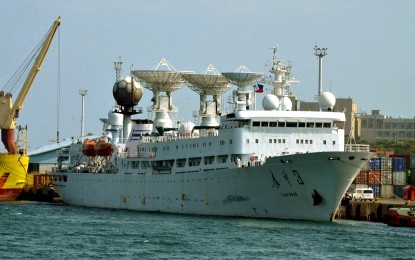News
EastMinCom Navy chief allays fears over Chinese ship in Davao City

Enriquez told reporters during the AFP-PNP press briefing on Wednesday that the entry of Yuan Wang 3 into Philippine waters via Davao had diplomatic clearance from the Department of Foreign Affairs (DFA). The clearance was requested by the Chinese Embassy in Manila. (Photo courtesy of Arjoy Ceniza via PNA)
DAVAO CITY – “There is nothing extraordinary.”
This was what Commodore Ramil Roberto Enriquez, commander of the Naval Forces Eastern Mindanano Command, said as he dispelled speculations over the docking of Chinese vessel Yuan Wang 3 on July 16 at the Sasa Port here.
Enriquez told reporters during the AFP-PNP press briefing on Wednesday that the entry of Yuan Wang 3 into Philippine waters via Davao had diplomatic clearance from the Department of Foreign Affairs (DFA). The clearance was requested by the Chinese Embassy in Manila.
Enriquez said Yuan Wang 3 is a state-owned vessel and therefore, needs appropriate clearances. He said the Chinese ship also obtained clearances from the Philippine Port Authority, which is the agency tasked to provide berthing space for all vessels coming to the country.
“So I was informed that as of July 16, when Yuan Wang 3 entered Davao Gulf, she has the necessary clearances issued by DFA,” Enriquez said.
Enriquez said the docking of the Chinese vessel was not routine practice but a normal port visit, just as other foreign ships normally conduct.
Yuan Wang 3 was not the first Chinese vessel that docked at the Port of Davao. A Chinese navy ship also made a port call in 2010, in 2012, and in 2015.
“There are instances that we accommodate vessels calling into our country,” Enriquez said.
Enriquez said there are times that foreign vessels seek clearance to dock in Philippine ports for replenishment like food and water provisions.
“These are things we accommodate. Sabot ni sa laing nasud (This is an agreement with other nations) the same way the Philippines is accorded the same privilege. This is an international agreement,” Enriquez explained.
Enriquez also pointed out that southern Mindanao is the most convenient routes for the Chinese vessels in going to the Pacific Ocean.
Earlier, Presidential Spokesperson Harry Roque said that whoever finds the Chinese vessel docking in the Philippines as alarming may have Sinophobia or the fear or dislike of China, its people, language or culture.





















